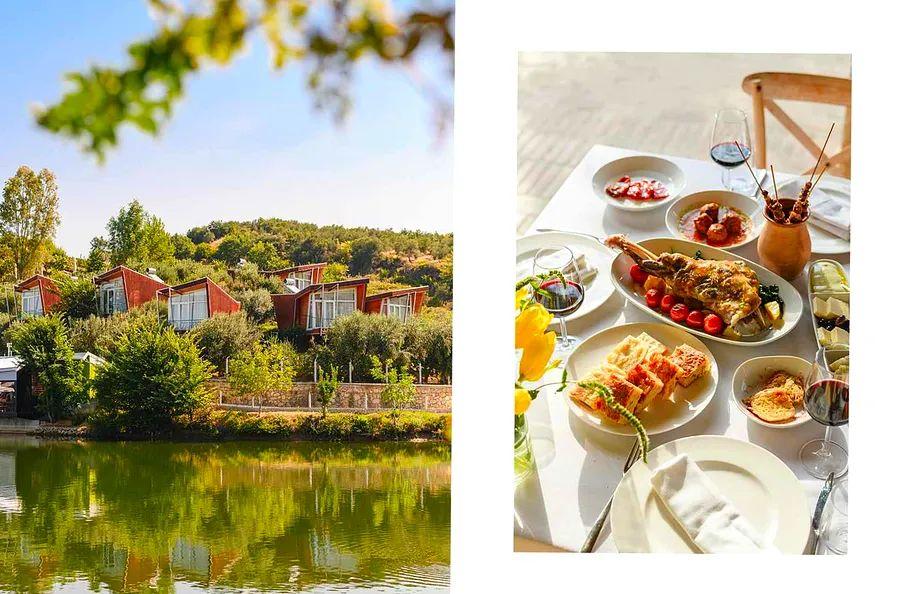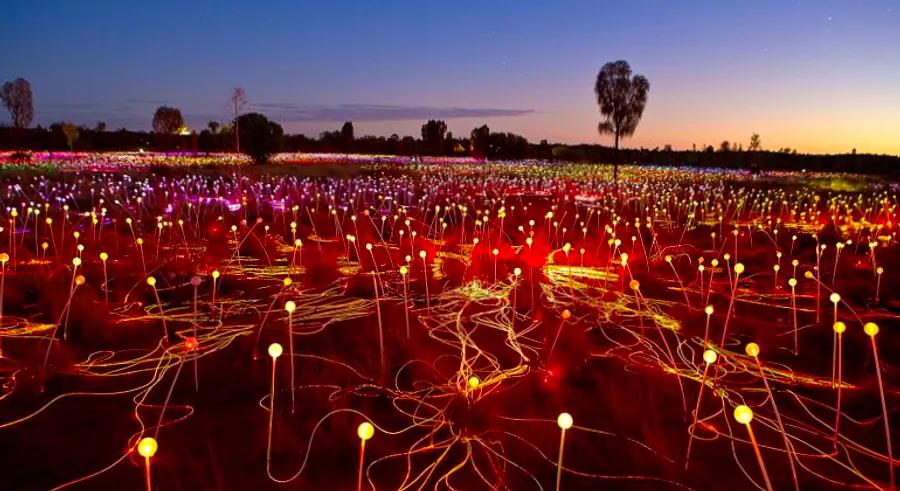Albania: A Hidden Gem for Food Lovers—Here’s How to Plan Your Visit

 From left: Waterfront bungalows at AgriTourism Huqi, just a half-hour from Tirana; at Agroturizëm Gjepali in western Albania, the lunch spread includes lamb shoulder with baked potatoes, cherry tomatoes, meatballs, savory custard pie, and shish kebabs.
Photo: Armand Habazaj
From left: Waterfront bungalows at AgriTourism Huqi, just a half-hour from Tirana; at Agroturizëm Gjepali in western Albania, the lunch spread includes lamb shoulder with baked potatoes, cherry tomatoes, meatballs, savory custard pie, and shish kebabs.
Photo: Armand HabazajAs Bedri Tila lifted a massive wooden lid from an oven embedded in the earth, smoke billowed and the aroma of lamb wafted through the cool morning air. We stood on a farm in central Albania, a short drive from Tirana. With no shared language, Tila and I communicated in the universal language of food enthusiasts: smiles, gestures, and tastings. Through much miming, he shared that he had been using this cooking method for seven years. In Albanian, mish në pus translates to “meat in a well,” aptly describing the underground oven where he was roasting an entire lamb. Tila skillfully carved a piece of meat and offered it for me to taste.
Tila is part of AgriTourism Huqi, a farm that features a restaurant, campsite, botanical garden, event space, and even a small petting zoo. Seven modern wooden cabins with simple yet cozy decor are nestled on a hillside, providing guests with stunning views of the lush surroundings and reservoir below. Its proximity to Tirana makes this spot a perfect day trip for those looking to enjoy traditional cuisine, attend local celebrations, and support a burgeoning agritourism industry.
 From left: Bedri Tila at AgriTourism Huqi prepares lamb in an underground oven; at Mrizi i Zanave, sundried tomatoes are preserved.
Photo: Armand Habazaj
From left: Bedri Tila at AgriTourism Huqi prepares lamb in an underground oven; at Mrizi i Zanave, sundried tomatoes are preserved.
Photo: Armand HabazajAlbania’s culinary heritage is shaped by the Mediterranean’s natural abundance, sitting just 50 miles from Italy across the Adriatic Sea. The country shares flavors and dishes with neighboring coastal regions—Montenegro to the north and Greece to the south—as well as the landlocked Kosovo and North Macedonia to the east. Crucially, Albania was under Ottoman rule for over 400 years until gaining independence in 1912. This influence is evident throughout the country, from the minarets that adorn Tirana’s skyline to qoftë, the beloved spiced meatballs.
After enduring a harsh Communist regime from 1944 to 1992, Albania has transitioned to democracy and emerged as one of Europe’s fastest-growing travel hotspots. Current Prime Minister Edi Rama is actively fostering international tourism, encouraging hotel brands to establish properties, and advocating for EU membership. Visitor numbers have surged as tourists flock to experience the country’s pleasant climate, nearly 300 miles of pristine Adriatic coastline, unspoiled landscapes, and the inviting, easy-to-navigate capital city.
Despite the many transformations over the centuries, the deeply rooted Albanian concept of besa, which emphasizes generous hospitality towards guests, has endured. This philosophy asserts that a home primarily belongs to guests and to God before the owner. It is particularly evident in the country’s agroturizëm establishments, family-run farms that offer small inns and restaurants serving meals crafted from local ingredients.
In April, I traveled to Tirana to connect with chefs and landowners who are fostering a renewed sense of national pride and ownership through their culinary endeavors. On my first day, I departed from my stylish hotel, La Suite Boutique, nestled in a quiet alley of the capital, and took a taxi for a 45-minute ride west. The bustling urban scene quickly transformed into stunning vistas featuring centuries-old castles rising from the hills. We encountered only one minor delay, which the driver noted was typical around here: a sheep traffic jam on the road.
I arrived at Agroturizëm Gjepali, a family-owned farm that has been in Fundim Gjepali’s lineage since the late 1800s. The nearby village of Gjepalaj is named after his ancestors. The farm's history reflects a dark period in Albania’s past. Beginning in 1946, the Stalinist regime of Enver Hoxha expropriated agricultural lands, including the Gjepali family’s farm, under a veil of isolation. When democracy emerged five decades later, the Gjepali family, like many others, received back roughly 10 percent of their original holdings.
 From left: A visitor enjoys the views at AgriTourism Huqi; a dessert tasting at Mullixhiu includes yogurt cake with pomegranate, a 'kadaif pipe,' and custard presented in an eggshell.
Photo: Armand Habazaj
From left: A visitor enjoys the views at AgriTourism Huqi; a dessert tasting at Mullixhiu includes yogurt cake with pomegranate, a 'kadaif pipe,' and custard presented in an eggshell.
Photo: Armand Habazaj“Thirty years post-Communism, we are still finding our way,” Gjepali reflected on his country. Albania faced significant challenges during the 1990s, as the collapse of the Eastern Bloc led to social turmoil and economic hardship. At the age of 15, Gjepali moved to Italy, where he worked in kitchens and rose to prominence as a chef. “It felt unjust for my family’s story to conclude in such a way,” he shared, becoming emotional as he recounted his grandfather and father's tales of their cherished farm. During his time in Italy, Gjepali nurtured the dream of returning and reclaiming the land. Gradually, the family began to buy back pieces of what they had lost; he estimates they now own about 20 percent of what they possessed in 1945 due to their relentless efforts.
I dedicated a large part of the day to exploring the estate. As the morning sun bathed the patio of the Tuscan-style building in warmth, I enjoyed a cup of cow’s milk that was as invigorating as strong coffee. Rich and thick, it resembled melted ice cream. The team at Agroturizëm Gjepali sources the milk from a neighbor with 10 cows, delivering it twice daily—once for breakfast and again to craft a selection of cheeses and churn into butter so flavorful it feels like it has been browned or clarified.
Later, Reti Sui, Gjepali’s niece who manages operations, took me on a tour. We strolled down a dirt path flanked by olive trees, past fields filled with lettuce, potatoes, and beans, and she showed me the government-built greenhouses where cucumbers and tomatoes thrive. In the afternoon, I savored local wine on the patio while watching a birthday party wrap up (many of these venues also host events).
 Dinner service at Mullixhiu restaurant in Tirana.
Photo: Armand Habazaj
Dinner service at Mullixhiu restaurant in Tirana.
Photo: Armand HabazajThat evening's dinner commenced with a delightful array of appetizers showcasing those very tomatoes and cucumbers, along with salty feta-like cheese and olives. I indulged in tavë balte, a comforting Albanian dish: a beef and pepper stew enriched with ricotta-style cheese, mildly spicy and vibrantly red, reminiscent of a creamy arrabbiata sauce. Following that was byrek me qumësht, a savory layered phyllo pie filled with custard, and a tripe dish packed with enough garlic to ward off vampires. A stunning pink and orange sunset illuminated the sky outside as the main courses were served, succeeded by a vibrant assortment of sliced fruit.
While there was a wine list available, at each estate I visited, the primary choice boiled down to red or white (the house wine is typically good, often excellent, and always served in generous pours). Sui mentioned that visitors were once hesitant about Albanian wines, but since Agroturizëm Gjepali exclusively offers local selections on its menu, guests have been encouraged to try them and discovered that they actually enjoyed them. 'Now, people have confidence that Albanian wine can be quality,' she said. The estate sources its red blend (a mix of Merlot and a local grape known as Shesh i Zi) and its white (crafted from another native variety, Shesh i Bardhë). Additionally, the family has earmarked land for a future winery.
More Trip Ideas: 25 Best International Destinations for Solo Travel
Some funding for establishing Gjepali and its upcoming ventures, including the vineyard, was provided by the government. In his successful 2021 campaign for a third term, Prime Minister Rama prioritized boosting tourism, paving the way for international hotel brands like Meliá and Radisson to set up shop in the coming years. In 2023, he designated Albania's Vjosa River—the last major European river free from dams or power stations—as a national park. The owners I spoke with noted that Rama's funding initiatives have enabled them to develop rural restaurants and agritourism stays that foster a slower, more thoughtful approach to tourism. 'It’s far better for me to cater to a hundred guests the way I prefer, rather than five thousand,' Gjepali remarked. He recognizes that change is on the horizon—especially with ongoing negotiations for Albania's EU membership after more than a decade of candidacy. However, he hopes that small-scale tourism can help maintain the country’s identity and values.
 Sheep feeding in Vlorë County, southern Albania.
Photo: Armand Habazaj
Sheep feeding in Vlorë County, southern Albania.
Photo: Armand HabazajThe following day in Tirana, I had a conversation with Bledar Kola, the chef-owner of Mullixhiu restaurant, about his journey. He left Albania at 15 and climbed the ranks in Michelin-starred establishments like Le Gavroche in London, along with internships at the groundbreaking (now closed) Fäviken in Sweden and Noma in Copenhagen. While a meal at Noma can exceed $580, Kola offers an eight-course Albanian tasting menu for just $29.
Kola, like Gjepali, grew up during a time when voicing dissatisfaction with bread quality could lead to imprisonment. (Under Communism, bakeries were state-run, making them extensions of the government.) Now, his aim at Mullixhiu is to have people fall in love with Albania through its cuisine. 'I can make that happen,' Kola stated. 'All I need are my pans, a pot, and a fire.'
During my dinner, Kola welcomed guests with bozë, a fermented corn drink, and served the delicate layered pancake dish fli topped with tender braised beef cheeks. A mill in the restaurant's window was used for grinding grain for bread and petka, a pasta dish stirred with stock that resembles risotto.
Even in the bustling city of Tirana, Kola actively supports Albanian agriculture through his sourcing practices. 'We aim to nourish two groups,' he explained: the diners at his restaurant and the farmers who raise the livestock and cultivate the fruits and vegetables. With minimal contribution from manufacturing, like car and machinery production, Kola emphasized that 'the country needs tourism.' However, he is firm that tourism must be sustainable and beneficial for all parties involved. 'Our industry should not be mass tourism,' he insisted. 'What we can offer best are food, culinary culture, and nature.'
 At Mrizi i Zanave, staff member Valmira Topalli carefully cleans the rind of a one-year-old goat cheese.
Armand Habazaj
At Mrizi i Zanave, staff member Valmira Topalli carefully cleans the rind of a one-year-old goat cheese.
Armand HabazajLocated a ninety-minute drive north of Tirana, chef Altin Prenga and his brother Anton welcomed me to the flourishing estate of Mrizi i Zanave. Like many of their peers, the brothers conceived Mrizi after moving to Trentino-Alto Adige, Italy, for work. After several years, they returned to their family farm and opened the restaurant in 2010, utilizing produce from their 50 acres as well as local small farmers to create multicourse lunches and dinners. In 2018, they transformed an old stone building into a guesthouse, beautifully replacing a crumbling stone corner with two stories of glass. The outcome serves as a striking reminder of how these establishments blend tradition with modernity.
More Trip Ideas: 25 Hidden Gem European Villages to Explore
Four years ago, the brothers began repurposing a former Hoxha-era jail into a production facility, giving their staff ample space to create wine, cheese, jams, pickles, and cured meats. Upon my arrival, a friendly waiter guided me through the low-brick structure, sharing its history. Behind each door, rooms once occupied by prisoners now held shelves of cured meats and jars of tomatoes, strawberry jam, pine syrup, or quince compote. A woman was stirring jars of onions and pickles, while nearby, jugs of raki—a traditional homemade brandy—infused with walnuts or mulberries. I tasted soft cheeses at the dairy, which sources cow and goat milk from 40 farms to produce specialties like kaçkavall, a local cheese that’s aged, herbed, and spiced. At the center of the complex, a brick tunnel leads underground to a bright cellar filled with barrels of house wine. In the modern tasting room, I felt transported to Tuscany or Napa, but stepping out into the courtyard surrounded by sturdy walls reminded me of the building's original purpose.
 Inside one of the rooms at the renovated guesthouse of Mrizi I Zanave.
Armand Habazaj
Inside one of the rooms at the renovated guesthouse of Mrizi I Zanave.
Armand HabazajAs my guide rushed back to the restaurant for his shift, I stayed outside with the animals, feeding corn to the adorable baby goats that nuzzled my hands. I explored the paths around the property, observing the solar-powered grain mill in action, purchasing edible souvenirs from the gift shop, and listening to the honking geese and ducks creating their own symphony until dinner time.
After a refreshing night at the guesthouse, I found myself once again beside an outdoor oven the next morning. This time, a team of cooks in blue aprons was preparing massive pans of byrek, delicious pastries filled with pumpkin or spinach and layered with cornmeal from the mill. Later that day, while savoring a wonderfully herbal bay-leaf ice cream, I watched a large family group enjoy several rounds of house-made raki, toasting each other with joyful shouts of “Gëzuar!”
Where to Stay
AgriTourism Huqi: Nestled in Durrës county, this location features seven modern wooden cabins elevated on columns, offering stunning views of a reservoir where guests can fish or rent paddleboats. The restaurant serves dishes made from fresh produce sourced from the surrounding organic orchards and fields.
Agroturizëm Gjepali: Located just 20 minutes from the Adriatic coast, this sixth-generation family-run farm features a hotel and a restaurant where chef-owner Fundim Gjepali presents an impressive tasting menu.
La Suite Boutique Hotel: Nestled in a tranquil alley of Blloku, a residential area in the capital Tirana, this hotel boasts 12 rooms adorned with luxurious jewel-toned velvet chairs and headboards.
Mrizi i Zanave: The stone guesthouse on this estate, situated in Lezhë county in northwestern Albania, underwent renovations in 2018, featuring floor-to-ceiling glass walls that provide stunning views of the surrounding countryside.
Where to Eat
Mullixhiu: This upscale restaurant in Tirana curates its eight-course tasting menu using ingredients sourced from local producers. Dishes include zucchini salad and quail with plum sauce.
Restorant Bardhi: Celebrating traditional Albanian cuisine, including their house-made raki, this restaurant is located near the historic Krujë Castle.
Plan Your Trip
AgroTimeAL: This app and website, developed with the help of the Albanian government, offers a comprehensive directory of the country’s agritourism spots, providing information on accommodations, tours, and dining options. Users can access locations in both list and map formats.
How to Book
T+L A-List travel advisor Daria Westerfield ([email protected]; 713-665-4767) specializes in trips to Central and Eastern Europe. She can organize journeys to Albania, which may include exploring the artisan bazaar in Krujë, enjoying outdoor dining at the 16th-century Lekursi Castle on the southern coast, and kayaking on Lake Ohrid near the North Macedonian border.
This article originally appeared in the July 2023 edition of Dinogo with the title 'In Season.'

1

2

3

4

5
Evaluation :
5/5